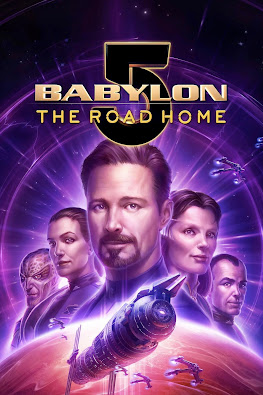The Road Home is the first animated film in the Babylon 5 franchise and the first new instalment of any kind since the release of DVD movie The Lost Tales in 2007. The animated medium allows the surviving actors to reprise their roles and also allows new actors to take over the roles of those actors who are sadly no longer with us (and, as oft-discussed, Babylon 5's attrition rate of actors has been extraordinarily high).
The main appeal of The Road Home is nostalgia: the animated film is so steeped in deep cut lore references to the original show that I'm not sure how much newcomers will get out of it, let alone the massive spoilers it contains for the events of the series. For a B5 veteran, it is tremendous fun to once again see Bruce Boxleitner, Claudia Christian, Patricia Tallman, Tracy Scoggins, Bill Mumy and Peter Jurasik reprise their roles as Sheridan, Ivanova, Lyta, Lochley, Lennier and Londo respectively. Peter Jurasik in particular slips back into his role as if zero time has passed, and his vocal delivery is spot-on (apart from Tallman, the other actors do have some of the sound of the intervening three decades in their voices). The newcomers are mostly decent, with Paul Guyet outstanding in replicating both Michael O'Hare and Tim Choate's vocal performances as Commander Sinclair and Zathras. Andrew Morgado has the hardest job in replicating the unique vocal stylings of Andreas Katsulas and wisely doesn't even try, instead choosing a similar haughty tone and making it his own.
The character animation is very nice, with a good amount of expression captured from the original actors, although the space CGI is sadly disappointing and lacking in detail: the White Star ships look like unfinished pieces of clay and the Starfuries look like their mid-1990s Micro Machine models. It's genuinely disappointing to see the spacecraft looking so lacking compared to their original incarnations, despite some good design ideas (the Shadow warships now having moving protuberances, for example).
In terms of story and character, The Road Home is a mixed bag. Sheridan flipping between time streams is a nice reuse of story elements from the Season 3 two-parter War Without End, but this promising idea is wasted slightly in revisiting scenes and ideas from the original show that we already saw decades ago. Newcomers will be lost without context and OG fans will find this material redundant. As the movie wears on and we get into newer ideas and start seeing alternate timelines where things unfolded differently, things pick up. It's also nice to get to see things we never saw in the original show, like a Vorlon planet-killer in full action and a Minbari jump gate in operation. But whilst that kind of trivia satisfies, there are also a bevy of continuity errors elsewhere that grate.
As a Babylon 5 project, the film has a lot of wince-inducing dialogue and awful humour, which was a hallmark of the original show, and to be frank would be missed if it wasn't present at least to some degree. However, the original show balanced that out with some beautiful speeches and occasional gags that worked well. The latter are mostly missing from this movie. This movie also mistakes long-worn-out memes as humour, so we get a ton of Zathras focusing on his "comic elements" and completely missing the pathos and tragedy that made the character so compelling on his original appearance in the episode Babylon Squared. Tone is something the movie struggles with a lot: the film feels too light and funny for the massive, grave stakes of the story, and any notion of subtlety from the original series has been lost. In the original, the Shadows were master manipulators who rarely emerged from the darkness and worked through disposable intermediaries and minions. Here, they are recklessly suicidal drones who directly attack enemies in swarms, not caring how many die in the process.
The movie (**½) leaves a Babylon 5 fan feeling conflicted: it is undeniably fun to see these characters again, and it's particularly gratifying to see an actual sequel project involving almost the entire cast of the show, for the first time since the end of the original series (the various spin-off media and DVD movies since then have involved just a few characters, or newcomers). The animation is solid, the voice acting mostly excellent, and at 80-ish minutes the film does not outstay its welcome. But the story feels a little pointless, the humour is often painful and the "alternate universe" set up in the movie as a possible future setting for new material is (at least at this prototypical stage) uninspiring.
The film is available on DVD, Blu-Ray and digital platforms now.
Thank you for reading The Wertzone. To help me provide better content, please consider contributing to my Patreon page and other funding methods.





